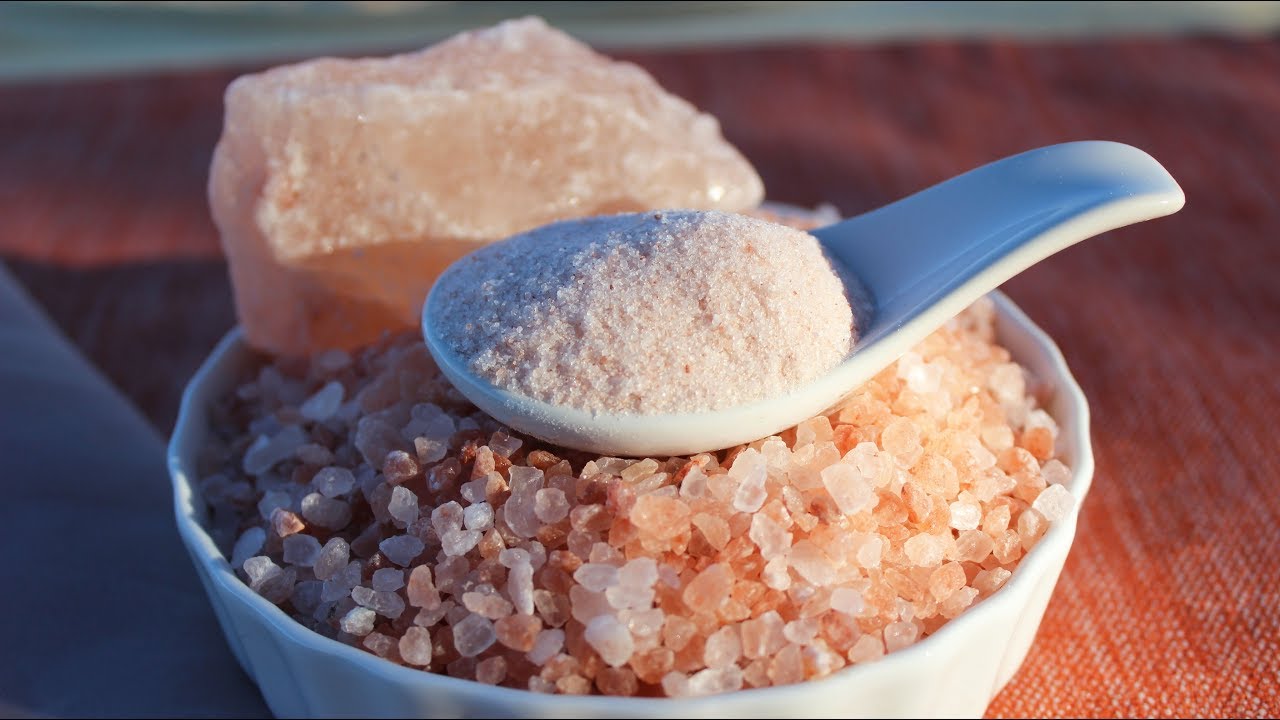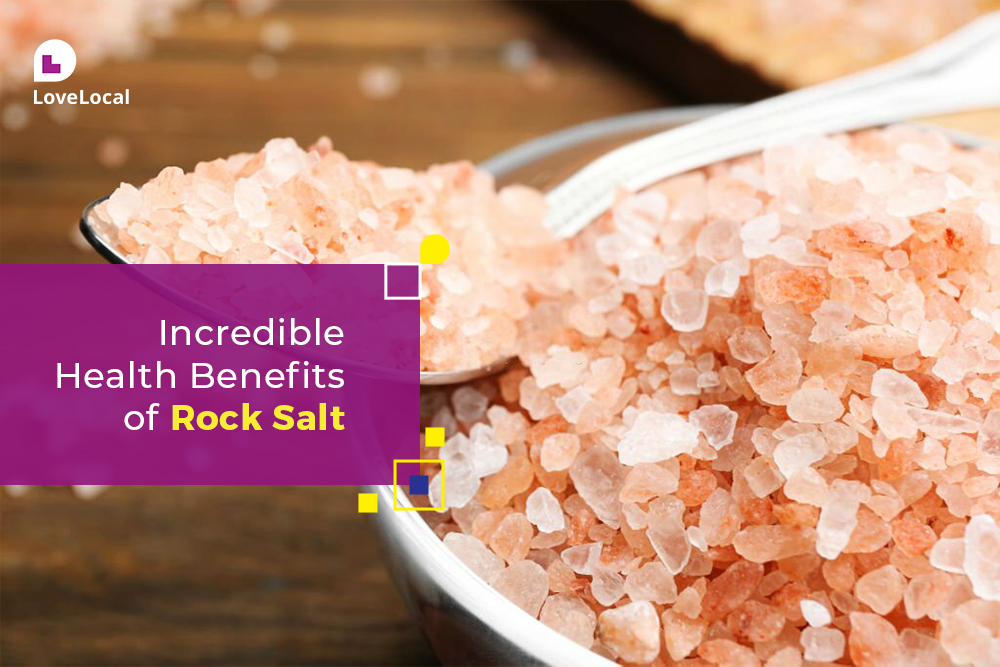Rock salt, also known as halite or mineral salt, is a natural wonder that has been cherished for its various health benefits and culinary uses for centuries. This unrefined salt is extracted from ancient sea deposits and is widely renowned for its distinct properties. Let’s delve into the world and discover the incredible advantages of rock salt for health, skin, and overall well-being.
Rock salt contains a combination of sodium chloride along with several essential micronutrients like calcium, magnesium, iron, sulfur, zinc, oxygen, hydrogen, and cobalt. These vital elements play a crucial role in supporting various bodily functions and contribute to your overall health and vitality. Here, we’ve outlined a range of benefits associated with the consumption of rock salt.

Promotes digestion.
Rock salt can indeed promote digestion. Its consumption can stimulate the production of digestive enzymes, which are essential for breaking down food in the stomach and intestines. This improved digestion can lead to a reduction in digestive discomfort such as bloating and acidity. The minerals present in rock salt, like magnesium and potassium, also play a role in maintaining a healthy digestive system. However, it’s important to use rock salt in moderation, as excessive salt intake can have adverse effects on digestion and overall health.
Boosts metabolism
Iodine is essential for the proper functioning of the thyroid gland, which plays a key role in regulating metabolism. However, it’s important to note that while iodine is present in some rock salt varieties, the concentration can vary, and it may not be a significant source of this mineral in the diet. Additionally, individual responses to iodine and its impact on metabolism can vary, and excessive iodine intake can lead to health issues.
Promotes healthy skin.
Rock salt benefits for skin extend to promoting healthy and radiant skin. This natural salt, with its mineral-rich composition, can be particularly advantageous for skincare. Here’s how rock salt contributes to skin health:
- Exfoliation: Rock salt is good for health that can serve as a natural exfoliant, helping to remove dead skin cells and impurities, leaving the skin smoother and rejuvenated.
- Acne Management: Its antibacterial properties can assist in managing acne by combating acne-causing bacteria and reducing breakouts.
- Skin Hydration: Rock salt baths or skincare products containing rock salt can help hydrate the skin and retain moisture, which is especially beneficial for individuals with dry skin.
- Detoxification: Bathing with rock salt can aid in detoxifying the skin by drawing out impurities, resulting in a refreshed and healthier complexion.

Relief from stress
· Rock salt may contribute to stress relief.
· Its use in salt baths can help relax the body.
· The minerals in rock salt promote a sense of calm.
· Soaking in a rock salt bath may alleviate tension.
· The soothing properties of rock salt can ease stress.
Relief from muscle cramps
Rock salt can indeed help provide relief from muscle cramps. Muscle cramps are often caused by an electrolyte imbalance, and rock salt, with its mineral content, can aid in restoring this balance. The magnesium and potassium in rock salt are particularly beneficial for muscle function. Magnesium helps muscles relax, while potassium assists in preventing muscle spasms.
Rock salt vs Sea salt:
| Characteristic | Rock Salt | Sea Salt |
| Source | Mined from underground salt deposits | Obtained by evaporating seawater |
| Mineral Composition | Primarily sodium chloride with trace minerals like potassium, calcium, and magnesium | Varied mineral content depending on the source, including magnesium, calcium, and potassium |
| Processing | Minimal processing, less refinement | Evaporated, typically with some processing to remove impurities |
| Texture | Coarser and larger crystals | Finer, smaller crystals |
| Flavor | Less briny, milder taste | Stronger, more pronounced saltiness |
| Color | Typically white, pink, or black, depending on impurities and minerals present | Can range from white to various shades of pink, gray, or black |
| Culinary Use | Often used for seasoning and preserving food, as well as in cooking and baking | Popular as a finishing salt for its texture and flavor, but also used in cooking |
| Price | Usually less expensive than sea salt | Can be more expensive, especially gourmet or specialty sea salts |
| Health Benefits | Contains trace minerals that can offer health benefits | Provides essential minerals and can offer health benefits, depending on the source |
Both rock salt and sea salt have their unique characteristics and can be suitable for different culinary applications based on your preference and the desired flavor and texture in your dishes.

Side effects of rock salt
· Excessive consumption of rock salt can lead to high blood pressure due to its sodium content.
· Overindulgence in rock salt may cause water retention and bloating.
· People with kidney problems should monitor their intake as it can strain the kidneys.
· Individuals with iodine deficiencies should avoid rock salt, as it lacks iodine.
· Rock salt should be used in moderation, as it can lead to excessive sodium intake.
· Prolonged or excessive use of rock salt may affect bone health.
· Some impurities in rock salt, if present, can be harmful, so it’s important to choose a reliable source.
Nutritional value of rock salt
| Nutrient | Amount per 100g (approx.) |
| Sodium chloride (NaCl) | 97.3 grams |
| Calcium (Ca) | 0.16 grams (160 mg) |
| Magnesium (Mg) | 0.05 grams (50 mg) |
| Potassium (K) | 0.012 grams (12 mg) |
| Iron (Fe) | 0.0007 grams (0.7 mg) |
What is rock salt? And how is it prepared?
Rock salt, also known as halite, is a naturally occurring salt found in underground deposits. It is primarily composed of sodium chloride with trace minerals. Rock salt is mined from these deposits and then crushed or ground to achieve the desired crystal size. The extracted salt is washed and purified to remove impurities. Afterward, it’s dried to eliminate moisture content. The final product is packaged in various forms for different rock salt uses, such as cooking, table salt, or even salt lamps. Unlike heavily processed table salt, rock salt retains its natural mineral content and is a preferred option for those seeking a less refined, more natural salt. It has various culinary and wellness applications.
Conclusion:
Rock salt, a natural and unprocessed form of salt, offers an array of health benefits that have been cherished for generations. From promoting digestion and regulating blood pressure to aiding in detoxification and soothing respiratory issues, rock salt is a versatile addition to a healthy lifestyle. As with any dietary or health regimen, it’s crucial to use rock salt in moderation and consult a healthcare professional if you have specific health concerns. Embracing the goodness of rock salt may be an excellent step towards a healthier and more vibrant life. Shop in Lovelocal and find out the quality products.



